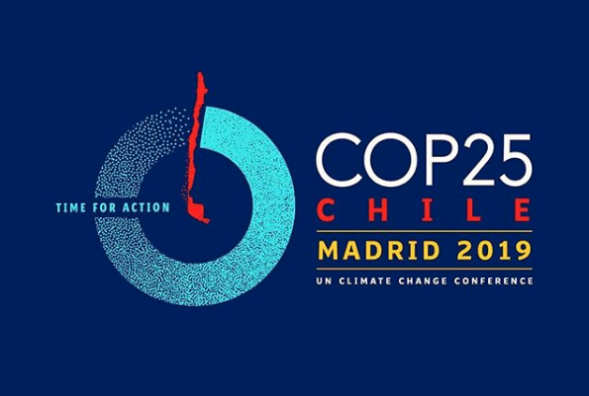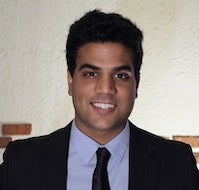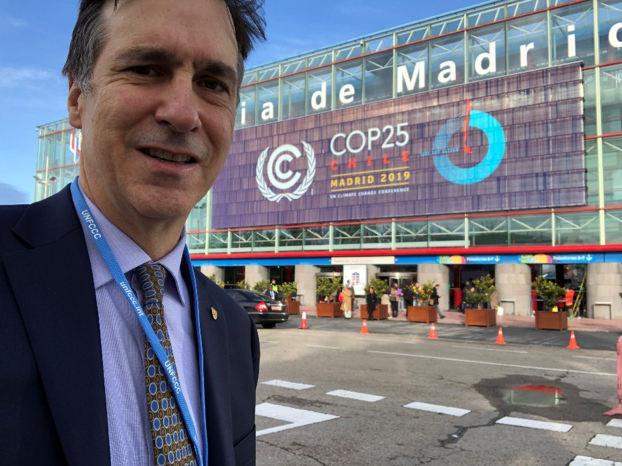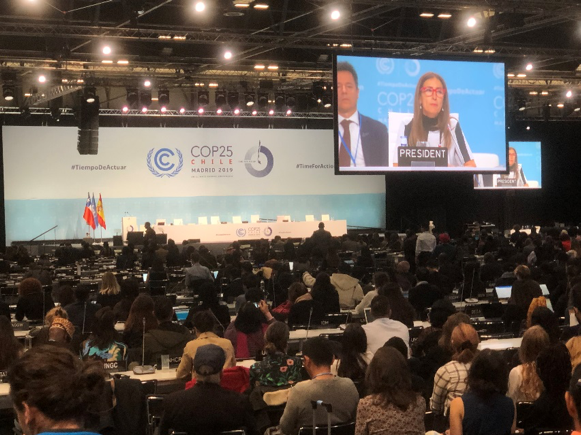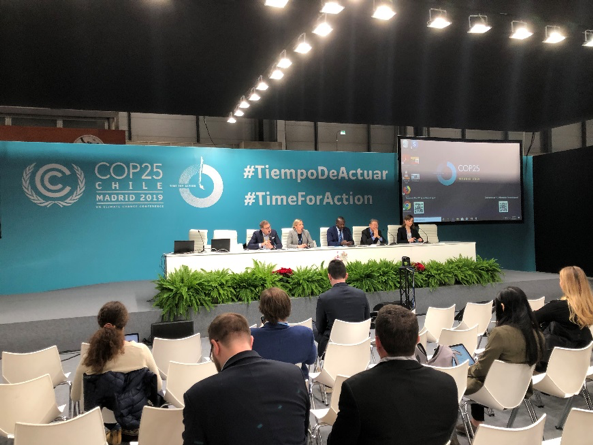Reflections on COP25 by Ian Rowlands
A special blog post written on December 6, 2019 by Waterloo Climate Institute member Ian Rowlands,Associate Vice-President, International, & Professor, School of Environment, Resources and Sustainability, University of Waterloo.
COP25 undoubtedly means many different things to many different people. The 30,000 (approximately) people involved in the United Nations Climate Change Conference are arriving in Madrid, Spain with different priorities, are interacting with various (but necessarily only limited) parts of the broad and deep agenda, and are engaging in a variety of conversations and activities throughout their time here. Of course, there is a collective agenda, and securing progress on the Summit’s priority items is critical. But the purpose of this blog is to reflect upon COP25 from a personal perspective.
And that person is me – a University of Waterloo faculty member and administrator, who has had a long-standing interest in climate change issues in general, and in the COP process in particular, and who has also supplemented his sustainability research and teaching interests with administrative activities during the past few years.
So, after four days at the Conference, here are some of my reflections.
1) The rich agenda
For those interested in climate change, the Conference offers the chance to be like the proverbial kid in the candy shop – there are so many interesting sessions, posters, displays, presentations, and debates, let alone people, here in Madrid! Be it across the dozens of side events that are held daily, or in the many pavilions that are also hosting activity, it is somewhat akin to a major conference (with multiple parallel sessions) housed within a larger intergovernmental negotiation.
Indeed, this is one striking difference for me – compared to my experience at COP21 in Paris, four years ago. On that trip, I was part of the University of Waterloo’s ‘week two’ delegation, and, by that time in 2015, focus at the Conference had turned to securing what became known as the Paris Agreement. Indeed, I have come to appreciate that, at COP, it is just as the Earth Negotiations Bulletin describes it:
Delegates will take stock of the implementation and ambition of climate action before 2020 through a series of technical meetings during the first week, and a high-level event for delegates to discuss mitigation, adaptation, support provided, and the Marrakech Partnership for Global Climate Action, during the second week.
What a privilege it has been to be part of ‘week one’ this time and thus to immerse myself in this rich agenda.
2) The climate emergency
Surrounded by so many people with such vast knowledge and strong commitment, one thing that is particularly striking is the magnitude of the climate change challenge. In basic terms, greenhouse gas emissions continue to rise, and global temperatures continue to rise. These trends need to be stopped and reversed ... and we have only a limited amount of time in which to take action. If we want to meet the Paris target of limiting global warming to 1.5°C, we need to start realizing 7.6% reductions in greenhouse gas emissions, annually! If we do not do so, the consequences – biophysical and social – will be dramatic.
Of course, what brings people to a COP is – for the most part – a desire to take action on global climate change. Consequently, it should not be particularly surprising that the level of urgency feels higher here than elsewhere in the world. But I sense that it feels particularly high here, because I am coming from Canada – indeed, from North America – which not only has relatively lower levels of concern, but – perhaps more importantly – is also a location where the climate change issue seems to be more partisan than in many other parts of the world. Whatever the reason, I have been reminded of the urgency of the climate change challenge these past few days.
3) The particular issues
As noted above, I recognize that I am seeing only a bit of the broad and deep agenda here in Madrid; nevertheless, there are items that are useful to the various roles I am occupying while here.
Waterloo Climate Institute – With the institute spearheading the University of Waterloo's participation in COP, it has been a pleasure to represent its interests here. One of the eight University of Waterloo university-level research centres and institutes, the Waterloo Climate Institute has members working on virtually every aspect of the climate change agenda. And at every turn here in Madrid, when I hear a theme being raised, I can think of a researcher back home doing work in that very area. Moreover, seeing Waterloo’s standing as one of the world’s top five universities for climate action highlighted in one of the Conference’s side events further illuminated the Centre’s global standing. I will take home a number of potential connections for us to pursue.
University of Waterloo senior leader – With my involvement in the development of the University’s recently-launched Strategic Plan – and the importance of that Plan going forward – I find myself often thinking of ways in which external opportunities fit with the Plan. This week in Madrid has presented me with a wealth of relevant possibilities, both generally and specifically:
- Climate change is mentioned multiple times in the University of Waterloo’s Strategic Plan. It is identified as one of the most important global challenges with which we will align our research strengths deliberately. Thus, the Plan encourages – in fact, demands – continued interaction, on the part of the University, with the climate change issue globally.
- And activities on the ground here in Madrid have suggested to me that Waterloo’s specific approach to these global challenges – interdisciplinary, international, and innovative – is particularly relevant at this time. As but one example, the emphasis upon connections between climate change and digitization – a fascinating theme I have heard many times here in Madrid as I have been introduced to the work of, for instance, the UN Secretary-General, the activities of the Climate Chain Coalition, and the priorities of the European Commission’s new leadership – speaks directly to many of Waterloo’s strengths. Indeed, my time here has shown that Waterloo’s expertise at – and experience with – collaborative, crosssectoral approaches is especially germane, for that is just what is being called for by the global community.
Faculty of Environment Researcher – My work as a climate change researcher has largely focused upon the ways in which decision-making at various levels (individual through to the global) around climate change mitigation options (particularly those that are energy-focused) unfold. Empirically, much of my recent work has been around energy storage technologies, as I have led a programme of work on ‘social acceptance’ within a pan-Canadian research network. And conceptually, I have been led by the interests and writings of many of my graduate students as they have used ideas from the ‘transitions literature’ to inform their investigations.
Of course, there is much of relevance for me as a researcher here in Madrid. Mitigation is still a critical issue, with it being clear that the present suite of NDCs (‘nationally determined contributions’) – even if successfully implemented – will still result in significant increases in global temperatures (by approximately 3°C). More needs to be done, and the Conference has revealed the role of actions at the individual, community, sub-state, state/national, international, and global levels. (Indeed, those last two levels have been central to the ‘
Article 6’ discussions – conversations which take me
back to my academic roots!)
And I have heard the word ‘transition(s)’ many times here. While not everyone quotes
Prof. Frank Geels when using it, at least implicit in the delivery is the notion that a transformative shift from the status quo is necessary. Moreover, the word is often delivered side-by-side with another: ‘just transition(s)’. This encourages consideration of the pathway for sustainability, recognizing its multiple dimensions. There is, of course, a rich discussion about the term, with contributions from
labour,
researchers, and
others. Ways in which fairness and related issues are considered within countries, across countries, and across generations are critical.
European aficionado – Those who know me know that I have a long-standing connection with Europe, as well as an ongoing affinity for the continent. It is wonderful to be in Spain for the first time, and to experience the beautiful city of Madrid. The street-scenes – for instance, the pastry shop windows and the inhabitants bundled into their winter-clothing in 10°C weather – bring back fond memories of my time living in Italy. And the complex (and effective) public transport system, plus the – for lack of a better term – ‘density of life’, remind me of many happy years in London.
What, however, is uniquely Madrid is what a wonderful host the city is proving to be. In any case, delegates would probably have said how smooth the proceedings have been run – accessible conference location, highly-functional facilities, warm hospitality, etc. – in any case; the fact that the city stepped up only a month before welcoming the world to its door makes this all the more remarkable. ... Well done, and thank you, Madrid!
4) The next steps
My time at COP25 is almost over. Week two will see a new set of University of Waterloo representatives here in Madrid. And, as noted above, they will be witness to negotiating efforts to take a number of ‘big issues’ across the finish line.
Regardless of the extent to which negotiators are successful next week (and, of course, I hope that they are extremely successful!), we will still be in a climate emergency. And 2020 appears set to be a pivotal year for the issue. The Paris Agreement-prescribed deadlines for decisions on a number of issues – in particular, mitigation and finance – will serve to make COP26 in Glasgow, Scotland in November 2020 critical. ‘Ambition’ is another oft-heard word here in Madrid. We need not only to articulate clearly our ambition, but also to act upon it, and ultimately to realize it!
